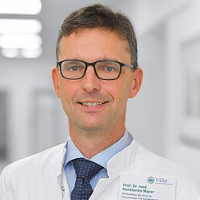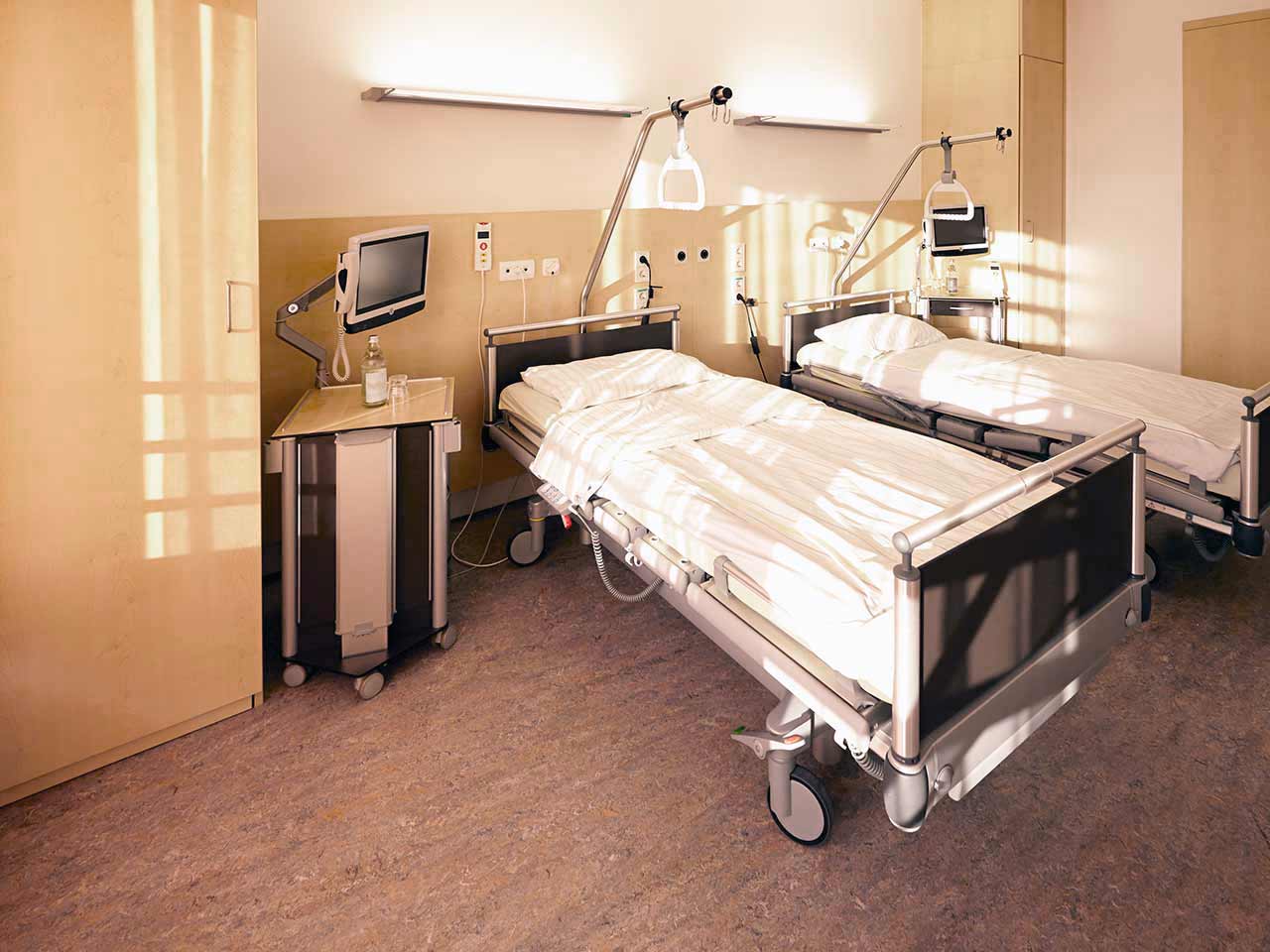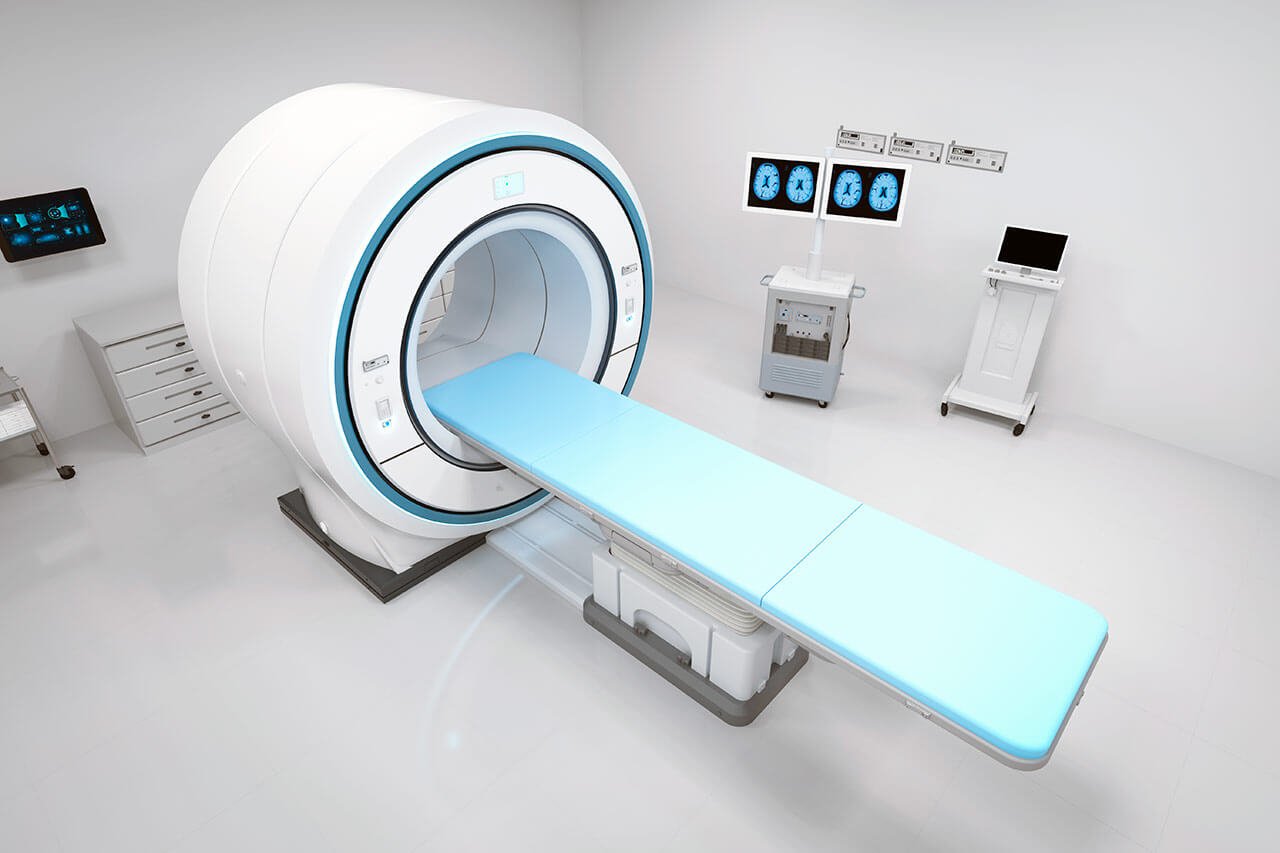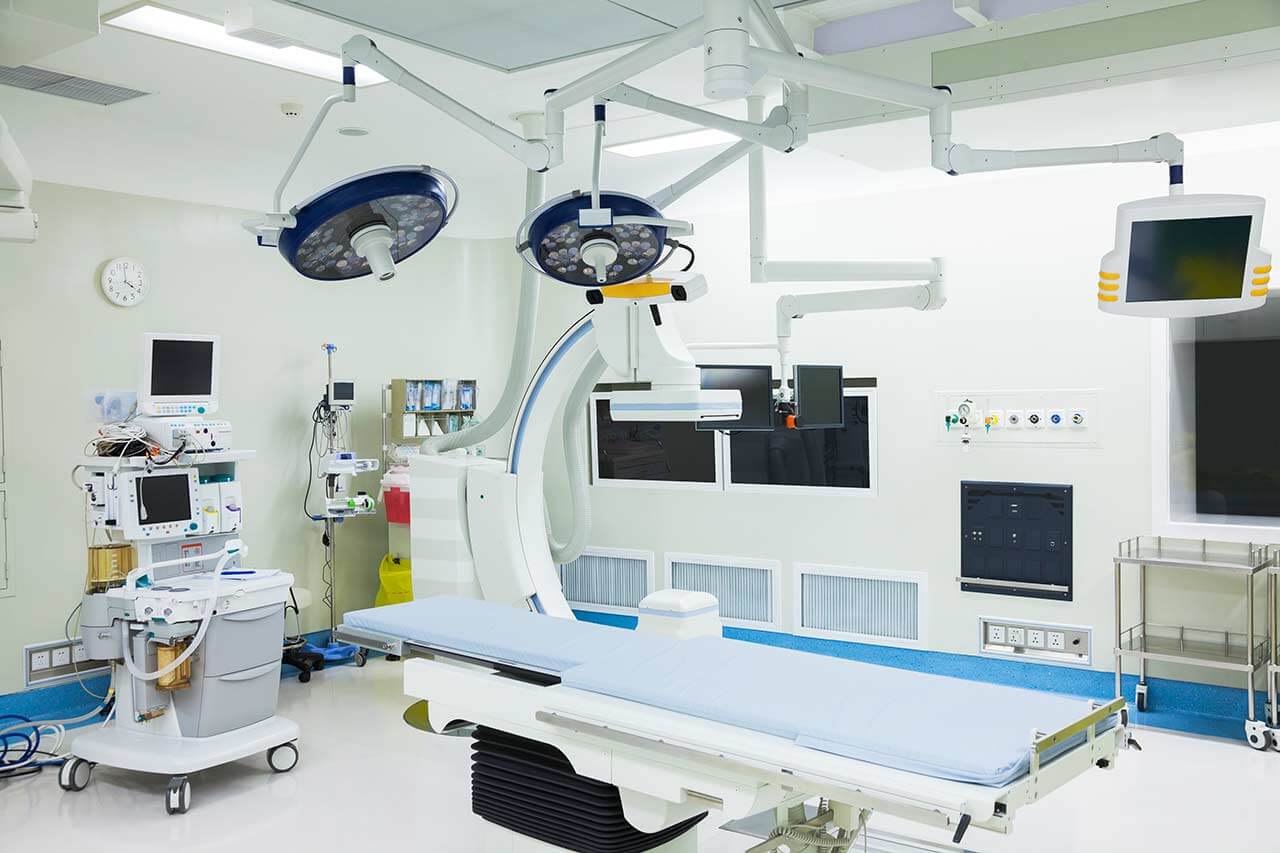
The program includes:
- Initial presentation in the clinic
- clinical history taking
- physical examination
- review of medical records
- laboratory tests:
- complete blood count
- general urine analysis
- biochemical blood analysis
- tumor markers
- indicators of inflammation
- indicators of blood coagulation
- CT/MRI
- ultrasound/ X-ray examination
- conduct endo-sonography of bronchi
- bronchoscopy with biopsy of bronchi and lungs
- histological/ cytological research
- nursing services
- consultation of related specialists
- consultation of the chief physician and all leading experts
- development of individual treatment plan
Required documents
- Medical records
- MRI/CT scan (not older than 3 months)
- Biopsy results (if available)
Service
You may also book:
 BookingHealth Price from:
BookingHealth Price from:
About the department
The Department of Pulmonology at the ViDia Hospital Karlsruhe offers the full range of medical services to patients with respiratory diseases. The department includes a Section for Pulmonary Function Tests, a Section for Endoscopy, a Sleep Laboratory, and a specialized outpatient clinic. The department's therapeutic options include drug therapy and minimally traumatic endoscopic procedures. The department's pulmonologists cooperate closely with thoracic surgeons, allowing them to jointly assess complex clinical cases and elaborate optimal treatment regimens. When diagnosing patients, the department's doctors also often work hand in hand with cardiologists. The medical facility provides care for patients with chronic obstructive pulmonary disease, bronchial asthma, lung emphysema, tuberculosis, respiratory insufficiency, pleuritis, pneumonia, and other conditions. The department also has all the resources to help patients with coronavirus infection and its consequences. In their work, the department's medical team strictly adheres to current clinical protocols, which contributes to the high efficiency of treatment. The Head Physician of the department is Prof. Dr. med. Konstantin Mayer.
The department is proud of its advanced Section for Pulmonary Function Testing, where all modern options are available for assessing lung ventilation parameters, respiratory mechanics, gas exchange in the lungs, pulmonary circulation, and other indicators. In this section, patients can undergo spirometry, spiroergometry, whole-body plethysmography, lung diffusion capacity measurement, and nonspecific and specific provocation tests. The department also has rooms for chest ultrasound scans and X-ray diagnostics. In cooperation with the Department of Cardiology, the specialists also carry out a catheter-based examination, namely right heart catheterization.
Endoscopic diagnostics is an integral part of the department's clinical practice. Endoscopic examinations of the respiratory organs are done in a specialized Section for Endoscopy equipped with state-of-the-art devices, including a fiberglass endoscope, a video bronchoscope, devices for endobronchial ultrasound and fluorescent bronchoscopy, an argon plasma projector, cryoprobes, an Nd-YAG laser, etc. Endoscopic diagnostics allow doctors to visually assess the condition of the upper and lower respiratory tracts from the inside and find pathological changes that cannot be detected using imaging examinations. Demanded procedures in the field of endoscopic diagnostics are biopsy of central and peripheral lung tumors, transbronchial needle biopsy, and bronchoalveolar lavage.
The Section for Endoscopy also performs effective therapeutic procedures, which are an excellent alternative to traumatic surgery. During endoscopy, the doctor does not dissect the skin and soft tissues. The department's specialists perform bronchoscopic interventions to remove foreign bodies from the respiratory tract, arrest internal hemorrhage, and eliminate airway stenosis. The Nd-YAG laser is used for the ablation of pathological lung lesions, including malignant tumors in the early stages. Argon plasma coagulation procedures are also successfully performed to destroy lung tumors and metastases.
The department's range of medical services includes:
- Diagnostics
- Pulmonary function tests
- Spirometry
- Spiroergometry
- Whole-body plethysmography
- Lung diffusing capacity measurement
- Respiratory drive and respiratory capacity (P0.1 and Pimax) measurements
- Respiratory center sensitivity to CO2 assessment
- Bronchoprovocation tests
- Right heart catheterization with assessment of pulmonary circulation reactivity
- Arterial blood gas analysis
- Lactate test
- Measurement of exhaled nitric oxide and carbon monoxide
- Endoscopic diagnostics of the respiratory organs
- Bronchoscopy with a biopsy of the central lung tumors
- Bronchoscopy with a biopsy of the peripheral lung tumors
- Bronchoscopy with transbronchial fine-needle aspiration biopsy
- Bronchoalveolar lavage
- Imaging diagnostics of the respiratory organs
- Ultrasound scans
- X-ray scans
- CT and MRI scans (in cooperation with the Department of Radiology)
- Pulmonary function tests
- Treatment
- Drug therapy: pills, injections, and infusions
- Endoscopic therapeutic procedures
- Removal of foreign bodies from the respiratory tract
- Hemostasis to arrest internal hemorrhage in the respiratory organs
- Bronchoalveolar lavage
- Placement of Polyflex, Dumon, Freitag, and Ultraflex stents to eliminate airway stenosis
- Laser ablation
- Argon plasma coagulation
- Other medical services
Curriculum vitae
Since July 1, 2019, Prof. Dr. med. Konstantin Mayer has been the Head of the Department of Pulmonology at the ViDia Hospital Karlsruhe. From 2005 to 2019, the specialist was a Senior Physician in the Department of Pulmonology at the University Hospital Giessen. Since 2015, he has also held the position of Head of the Section for Lung Transplantation and Cystic Fibrosis.
Prof. Mayer has received many awards for his outstanding clinical and research work, including the Scientific Award from the German Respiratory Society and the Intensive Care Research Award from the German Society for Medical Intensive Care Medicine and Emergency Medicine. Prof. Konstantin Mayer is a member of several national and international committees for the development of medical guidelines in the field of pulmonology and a member of the Section for Lung Transplantation of the Monitoring Commission of the German Medical Association.
Prof. Mayer has exceptional competence in the care of patients before and after lung transplantation. In addition, the doctor has additional qualifications in the field of infectology, which contributed to his successful experience treating patients with COVID-19.
Photo of the doctor: (c) ViDia Kliniken Karlsruhe
About hospital
The ViDia Hospital Karlsruhe is a modern medical facility with a rich history and traditions. The medical complex is an academic hospital of the University of Freiburg, granting patients access to advanced university medicine and the very latest therapeutic developments. The hospital first opened its doors in 1851 and, since then, has maintained a leading position in the European medical arena. The health facility offers a state-of-the-art technical base, comfortable infrastructure, and highly qualified doctors. All this allows the hospital to provide patients with top-class healthcare in accordance with modern standards. In addition, the hospital's team honors Christian traditions, emphasizing a humane attitude towards the patient and striving to provide understanding and support.
The hospital employs a large team of specialists, consisting of over 3,200 staff members, including 400 highly qualified physicians. The medical team admits more than 50,000 inpatients every year, and about 100,000 patients are diagnosed and treated on an outpatient basis or in a day hospital. More than 3,000 babies are born in the maternity rooms of the Department of Obstetrics every year. More and more patients, including those from abroad, come to the hospital for medical care annually.
The hospital has 24 specialized departments with 25 highly certified, narrowly focused centers integrated into them. A large Cancer Center certified according to the German Cancer Society (DKG) standards also operates here. Thus, one of the main clinical focuses of the medical complex is cancer treatment. The hospital also excels in other specialties, such as general surgery, abdominal surgery, thoracic surgery, orthopedics, cardiology, endocrinology, otolaryngology, pulmonology, gastroenterology, and others. There are 37 operating rooms available here for surgical treatment, the equipment of which corresponds to the highest technical level. Priority is given to performing minimally traumatic operations using minimally invasive, endoscopic, arthroscopic, and endovascular techniques.
The ViDia Hospital Karlsruhe enjoys a high reputation in Germany and far beyond its borders. The health facility successfully combines innovative medicine with Christian values, thanks to which the patient receives not only effective treatment but also care, understanding, and support.
Photo: (с) depositphotos
Accommodation in hospital
Patients rooms
The patients of the ViDia Hospital Karlsruhe stay in comfortable single and double rooms with modern design. Each patient room has an ensuite bathroom with a shower and a toilet. The standard room furnishings include an automatically adjustable bed, a bedside table, a table and chairs, a wardrobe, a telephone, a TV, and a radio. Wi-Fi access is also available in the patient rooms.
Patients can also be accommodated in enhanced comfort rooms. These rooms are very spacious and are additionally equipped with a safe, a mini-fridge, and upholstered furniture.
Meals and Menus
The patients of the hospital are offered three tasty meals a day: breakfast is served buffet-style, and there are several set menus to choose from for lunch and dinner.
If, for some reason, you do not eat all of the foods, you will be offered an individual menu. Please inform the medical staff about your dietary preferences prior to treatment.
Further details
Standard rooms include:
![]() Toilet
Toilet
![]() Shower
Shower
![]() Wi-Fi
Wi-Fi
![]() TV
TV
Religion
There are several chapels on the territory of the hospital. Regular Catholic and evangelical services are held here. Patients can also visit one of the chapels at any time to find a quiet place to pray, if desired.
Accompanying person
Your accompanying person may stay with you in your patient room or at the hotel of your choice during the inpatient program.
Hotel
You may stay at the hotel of your choice during the outpatient program. Our managers will support you for selecting the best option.





